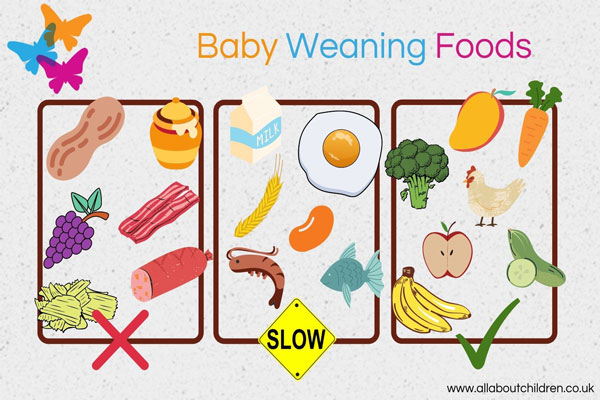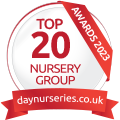At around six months, your baby will be ready for their first taste of solid food. Most parents have lots of questions about this important milestone, so our weaning guide for beginners provides you with useful tips and advice to help you get started on your baby’s weaning journey.

What does weaning mean for you and your baby?
Weaning might seem like a big change, but it’s one that will happen gradually. Your baby’s tummy is still very small, so they won’t be eating full meals straight away. In the first year of life, milk is still their main source of nutrition, but as the weeks and months pass, the amount of food that your baby is eating will slowly start to increase.
Weaning can be worrying (how much are they having and is it enough?) and a hard work at times (who knew how much mess could made in one mealtime?), but for most families it’s also fun and exciting to introduce new flavours to your baby for the first time.
When is your baby ready for solid foods?
Current guidelines from the NHS state that generally babies can start to wean from around six months old. However, every baby is different so it’s best to start weaning when they’re showing signs that they’re ready. Here are the signs to look out for:
- Sitting up unaided. It’s important that your baby can sit up and hold their head steady without help so that they can swallow food safely without choking.
- Hand-eye coordination. Babies will be clumsy at first, but they need to be capable of picking up food and putting it in their mouth.
- Swallowing food. Before they’re ready to wean, babies have a ‘gag reflex’ that pushes food back out of their mouth if they try to swallow it. As they reach around six months, the gag reflex moves further back in their mouth, which means they’re ready to start eating.
You can always seek advice from your health visitor and GP too if you want further clarification to check to see if your child is ready.
Is your baby eyeing up your breakfast?
Some people notice that their baby is hungrier than usual, or maybe they keep staring at the food on your plate. While these might seem like signs they want to eat, you shouldn’t count on these behaviours alone.
Babies’ appetites change a lot because they’re growing at a phenomenal rate. And although your meal might seem super-fascinating to your little one, it’s
likely that they’re just showing a healthy curiosity of the world around them. They’re not ready to start weaning until they show the three developmental signs above, at around six months of age.
Why is weaning important?
One big reason for weaning is that babies need food. After the first six months of life, milk alone is no longer enough to provide all the nutrients they need.
But that’s not all, weaning also has an important role to play in your child’s overall development. Babies who practice dealing with solid foods are also developing the mouth, tongue and jaw movements they need to begin to talk. This is also why it’s important to move from purees onto solid foods at the baby’s own pace.
When to start weaning
Wait until your baby is showing signs that they are ready to wean and choose a quiet time when you’re not in a rush. Eating might not be something your baby will ‘get’ straight away, so even though this might sound strange, it’s best to introduce their first food when they’re not likely to be too hungry. If their tummy is empty, you might only frustrate them by offering a spoon or a cucumber stick that they don’t know what to do with, instead of their usual and expected milk feed.
What to start weaning with
First foods
Your baby won’t eat much at first, so start with tastes of a single food once a day. Introduce new flavours gradually, so they get used to a range of tastes. Many parents choose to blend up or mash fruits and vegetables like broccoli, carrot, sweet potato or apple and offer a spoonful. Or you could offer cooked sticks of vegetables that babies can have a go at grabbing and eating by themselves.
Foods to avoid
There are certain foods that shouldn’t be given to babies. These include:
- Honey. This can contain a bacterium that can be harmful to babies, so shouldn’t be given to babies under one.
- Whole nuts and peanuts. Current NHS guidelines say that whole nuts shouldn’t be given to babies. If you do want your baby to have nuts, they must be crushed or ground up to avoid choking and if there is a history of food or other allergies in your family then seek advice from your GP or health visitor first. For more information visit the NHS guidelines.
- Whole grapes. These can get stuck in your baby’s windpipe, so cut them in quarters before serving.
- Salt and salty foods like sausages, crisps and bacon. Limit baby’s salt intake to a maximum of 1g a day.
Foods to introduce gradually
Some foods are more likely to trigger allergic reactions. These are:
- Cow’s milk (in food) and cheese
- Eggs
- Nuts and seeds (served crushed or in nut butters, so your baby doesn’t choke)
- Soya
- Foods containing gluten, such as wheat and barley
- Fish
- Shellfish
It’s important to introduce these foods separately so that if your baby does react, you can tell what’s causing the problem. Don’t be tempted to avoid these foods, as current evidence suggests that coming into contact with them from babyhood can actually reduce the risk of developing an allergy.

Get used to bitter tastes first
It’s natural for babies to prefer the sweeter tastes of fruit, sweet potato and carrot compared to bitter tastes like broccoli or spinach. Many people decide to introduce these bitter tastes first, so the baby has a chance to get used to them before trying the sweet stuff.
What to expect from weaning?
It may take time for your baby to get the hang of eating. At first, it’s all about exploring tastes and textures – and probably, making a lot of mess! Don’t be discouraged if your baby doesn’t seem to be eating ‘by the book’. Playing with food without eating much is perfectly normal – as is gobbling it all up and asking for more. As long as they’re still getting their milk feeds and putting on enough weight, your baby will thrive.
Weaning FAQs
Which is best, baby-led weaning or spoon feeding?
That depends on you and your baby! Baby-led weaning – letting the baby take the lead by feeding themselves some of the same food you’re eating – can be great if you have other children to look after at mealtimes, or if you want them to experience a wide range of tastes and textures, but requires careful supervision.
Spoon feeding can help you keep track of how much your baby is eating and can be a lot less messy. Many parents end up opting for a mixture of the two approaches.
Do I need any special equipment?
Yes – you’ll need:
- a highchair
- plenty of bibs
- baby bowls
- spoons
If you’re pureeing batches of food and freezing them, stock up on freezer bags or Tupperware containers. A mat to go underneath the highchair could also save you from mopping the floor every mealtime!

What snacks should I offer?
At six months, it’s best not to offer too many snacks outside mealtimes. That’s because milk still contains many of the most important nutrients, so they shouldn’t be too full for their milk feed. If you’re out and about and want to offer a snack, try sticks of fruit or veg.
What if my baby chokes?
This is a big worry for many parents. The first thing to say is that it’s normal for babies to gag a little when they try to put too much food in their mouths. You can tell that this is different to choking because they’ll tend to cough and splutter, whereas choking is silent. If you think your child is choking, follow these first aid instructions from the Red Cross.
Choking is a real danger, so never leave your baby unattended with food and don’t give them anything that could get stuck in their windpipe, like whole grapes or nuts. You might want to take a baby first aid course before weaning, for peace of mind.
Weaning at your day nursery
All About Children are passionate about the importance of a balanced and nutritious diet, at all ages. When it’s time for your baby to wean, we’ll work with you to ensure they are happy and well-fed. We always ask you to try new foods at home, just in case your baby is unfamiliar with certain foods we would give them at the nursery. We do not serve any nut-based products at our nurseries.
Find out more about our approach to meals and weaning. We’re always happy to discuss weaning with you, so please do contact us with any enquiries.

